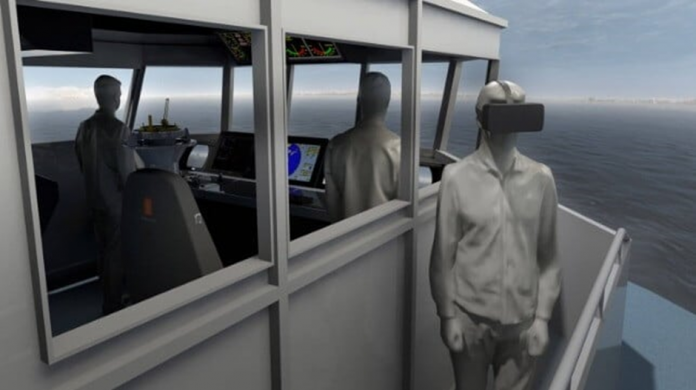
The Royal Navy has decided to adopt headset-enabled virtual reality simulation as part of its officer training curriculum. The systems will supplement traditional classroom instruction, augmenting bridge simulation and expanding the options for instructors to present material.
The new training technology will be used across the service with deployment at the naval warfare training center at HMS Collingwood; at the Britannia Royal Naval College in Dartmouth; and at the Submarine Service’s headquarters in Faslane.
The headsets are an auxiliary component of the service’s new bridge simulators. Three full-scale and two small-scale sims will be installed at HMS Collingwood, and the naval college and the submarine service will get similar equipment manufactured by the same vendor. For the first time, all three training sites will be using the same gear – and eventually, the plan is to connect them up for real-time training “maneuvers” involving multiple simulated vessels.
The scope of sim capability covers everything from pilotage to UNREPS to task force maneuvers, and the VR headsets will help make the training experience more immersive, according to manufacturer Kongsberg.
“Nothing beats practical experience . . . but the new simulators should markedly increase the preparedness of the students,” said Lt. Commander Maerk Raeburn, head of navigation training at HMS Collingwood. “As the suite of simulation will also be increased at Dartmouth and Faslane, this will allow cohesive training on the same software.”
VR headsets are under consideration in the tightly-regulated world of merchant mariner training as well. The concept has already been used for practical training applications in several nations, including Norway, Japan and Australia. Some training providers think that it could be used as a standalone tool for lower-end simulation, freeing up scarce bridge sim hours for more complex scenarios.
“I think there are trainings we could do at the entry level, like basic Rules of the Road,” said Jon Kjaerulff, Director of Business Development for MITAGS, the U.S.-based training academy affiliated with the Masters, Mates & Pilots (MMP), speaking to TME last year. “You could have students all over the country or a classroom of people, all wearing headsets. And all of them could be on the same virtual ‘bridge’ for the training.”
Source – THE MARITIME EXECUTIVE




